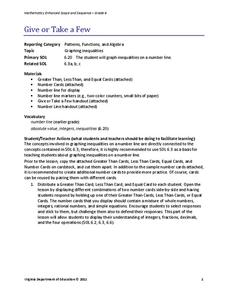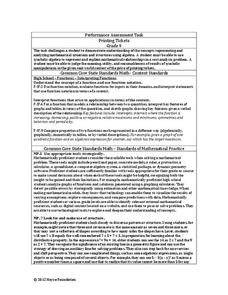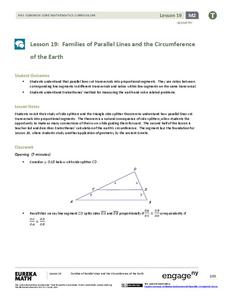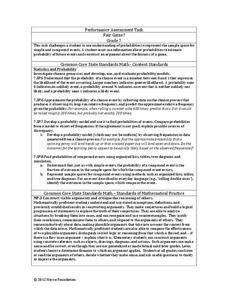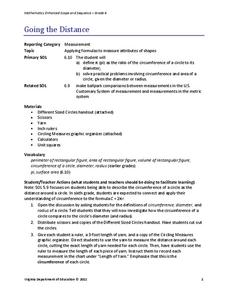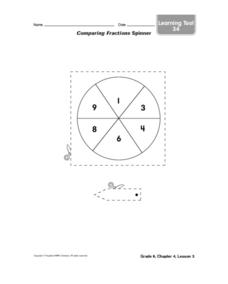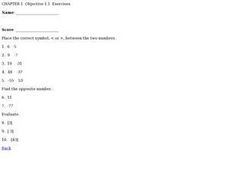Noyce Foundation
Gym
Give the class a mental work out with an assessment task in which young mathematicians compare several gym membership options. They use substitution to calculate the cost for given numbers of months.
Virginia Department of Education
Give or Take a Few
Young mathematicians extend their knowledge of rational numbers on a number line to graph inequalities by first using number cards to compare rational numbers. They finish by using similar reasoning to graph inequalities on a number line.
Waterloo Mathematics
Number Sense and Numeration: Ratio and Rate
Seventh-graders solve 20 various types of problems related to ratio and rate. They write ratios in simplest form for each given statement, to compare the area of two figures, and write two ratios equivalent to each ratio. Pupils express...
Inside Mathematics
Printing Tickets
Determine the better deal. Pupils write the equation for the cost of printing tickets from different printers. They compare the costs graphically and algebraicaly to determine which printer has the best deal based upon the quantity of...
EngageNY
The Pythagorean Theorem
Class members explore the estimation of irrational numbers in association with the Pythagorean Theorem. The first instructional activity of this module challenges pupils to use the Pythagorean Theorem to find unknown side lengths. When...
Virginia Department of Education
Box-and-Whisker Plots
The teacher demonstrates how to use a graphing calculator to create box-and-whisker plots and identify critical points. Small groups then create their own plots and analyze them and finish by comparing different sets of data using box...
Virginia Department of Education
Analyzing and Interpreting Statistics
Use measures of variance to compare and analyze data sets. Pupils match histograms of data sets to their respective statistical measures. They then use calculated statistics to further analyze groups of data and use the results to make...
Mathed Up!
Ordering Fractions, Decimals, and Percentages
Give scholars the opportunity to show what they know about ordering fractions, decimals, and percents with a five-page, eight-problem independent practice. With clear instructions and supportive advice, learners are bound for a...
Inside Mathematics
Party
Thirty at the party won't cost any more than twenty-five. The assessment task provides a scenario for the cost of a party where the initial fee covers a given number of guests. The class determines the cost for specific numbers of guests...
Virginia Department of Education
Absolute Value
Your birthday can be more than just about presents; it can even teach about absolute value. The class investigates absolute value as the distance from zero on a number line. Plotting birth months and comparing each birth month to July...
Resource Room
Multisensory Teaching: Positive and Negative Integers
Working with thermometers, sixth graders compare the value of positive and negative numbers. Plenty of teacher suggestions and independent practice ideas are presented. This website links to two more parts in this first of three integer...
Rice University
Algebra and Trigonometry
Move on into trigonometry. An informative eBook takes the content of a College Algebra course and adds more relating to trigonometry and trigonometric functions. The content organization allows pupils to build upon their learning by...
EngageNY
Families of Parallel Lines and the Circumference of the Earth
How do you fit a tape measure around the Earth? No need if you know a little geometry! Pupils begin by extending their understanding of the Side Splitter Theorem to a transversal cut by parallel lines. Once they identify the proportional...
Noyce Foundation
Fair Game?
The game should be fair at all costs. The mini-assessment revolves around the ability to use probabilities to determine whether a game is fair. Individuals determine compound events to calculate simple probabilities and make long-run...
Lakeshore Learning
Equivalent Fraction Activities
Spin the wheel of the fraction contraption and learn about equivalent fractions! After constructing their own spinners, kids use printable pizzas to represent fractions that are equal in value.
Virginia Department of Education
Going the Distance
Estimate the value of one of the most famous irrational numbers. The hands-on activity instructs classmates to measure the circumference and diameters of circles using yarn. The ratio of these quantities defines pi.
Curated OER
Comparing and Ordering Whole Numbers
In this math learning exercise, students compare and order whole numbers. They apply the skill to the other word problems and determine least and greatest values.
Curated OER
Comparing Fractions Spinner
In this math activity, students create a game spinner which is labeled for use in a comparing fractions game. The spinner is labeled with the numbers form 1-9. There are no directions.
Curated OER
Chapter 1 - Objective 1.1 Comparison of Whole Numbers
In this comparison worksheet, students compare positive and negative numbers, identify the opposite of a number, and evaluate absolute value of given numbers. This one-page worksheet contains ten problems.
Curated OER
Big and Small Geometric Shape Size Comparison
In this geometric size comparison worksheet, 1st graders look a the shapes in four sections on the page. They circle the smaller of the two shapes and draw a line under the bigger shape. They see triangles, rectangles, squares, and circles.
Curated OER
Comparing Shamrock Numbers (C)
In this comparing shamrock numbers worksheet, students determine and circle the greatest amount out of three numbers shown in six shamrocks.
Curated OER
Comparing Shamrock Numbers (E)
In this comparing shamrock numbers worksheet, students determine and circle the greatest amount out of three numbers in each of six shamrocks shown.
Curated OER
Comparing Shamrock Numbers (A)
In this comparing shamrock numbers activity, students determine and circle the greatest amount out of three numbers in each of the six shamrocks shown.
Curated OER
Comparing Shamrock Numbers (I)
In this comparing shamrock numbers worksheet, learners practice circling the greatest number out of three in six sets of shamrocks.



